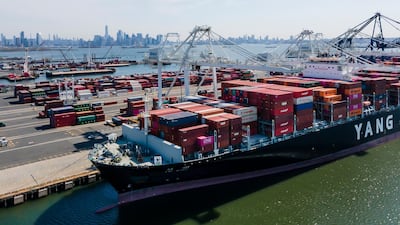The Covid-19 pandemic-induced surge in container shipping rates is expected to continue throughout 2021 and the price hike will be passed on to consumers, a United Nations report said.
Policy makers must focus in the long term on further reforms in trade facilitation and ports, improved tracking and forecasting, and strengthening national competition authorities, the United Nations Conference on Trade and Development (Unctad) said in a policy brief.
“The ripples will hit most consumers,” Jan Hoffmann, head of Unctad’s trade and logistics branch, said. “Many businesses won’t be able to bear the brunt of the higher rates and will pass them on to their customers.”
About 80 per cent of the goods we consume are carried by ships, he said.
Global container shipping rates spiked during the Covid-19 pandemic. Changes in consumer behaviour and shopping patterns, including an increase in e-commerce during lockdowns, led to increased demand for imported consumer goods, a large part of which is moved in shipping containers. Container rates have an impact on global trade, since almost all manufactured goods – including clothes, medicines and processed food products – are shipped in containers.
When the Ever Given megaship blocked traffic in the Suez Canal for almost a week in March, it triggered a fresh surge in container spot freight rates, which had begun to ease from the record highs reached during the Covid-19 pandemic.
"Shipping rates are a major component of trade costs, so the new hike poses an additional challenge to the world economy as it struggles to recover from the worst global crisis since the Great Depression," the report said.
The increase in shipping rates is one of a number of inflationary pressures faced by businesses and consumers, with fuel costs also increasing and other businesses hiking prices in a bid to recoup losses incurred during periods of movement restrictions. The head of the International Air Transport Association, Willie Walsh, called for governments to intervene to stop "monopolistic-type behaviours" by some airports and other parts of the industry's supply chain earlier this month.
The spike in demand for container shipping during the pandemic further increased as governments eased lockdowns and approved national stimulus packages, and businesses stocked up in anticipation of new waves of the pandemic.
“The increase in demand was stronger than expected and not met with a sufficient supply of shipping capacity,” the Unctad policy brief said, adding that the subsequent shortage of empty containers “is unprecedented”.
“Carriers, ports and shippers were all taken by surprise,” it said. “Empty boxes were left in places where they were not needed, and repositioning had not been planned for.”
The impact on freight rates has been greatest on trade routes to developing regions, where consumers and businesses can least afford it.
Currently, rates to South America and western Africa are higher than to any other major trade region. By early 2021, for example, freight rates from China to South America had jumped 443 per cent compared with 63 per cent on the route between Asia and North America’s eastern coast, it said.
This is partly because routes from China to countries in South America and Africa are often longer. More ships are required for weekly service on these routes, meaning many containers are also “stuck” on these routes.
“When empty containers are scarce, an importer in Brazil or Nigeria must pay not only for the transport of the full import container but also for the inventory holding cost of the empty container,” the policy brief said.

Another factor is the lack of return cargo. South American and western African nations import more manufactured goods than they export and it’s costly for carriers to return empty boxes to China on long routes.
Policymakers need to implement reforms to make trade easier and less costly, the UN agency said.
By reducing physical contact between workers in the shipping industry, such reforms, which rely on modernising trade procedures, would also make supply chains more resilient, it said.
Policymakers need to promote transparency and encourage collaboration along the maritime supply chain to improve how port calls and liner schedules are monitored, Unctad said.
Finally, governments must ensure competition authorities have the resources and expertise needed to investigate potentially abusive practices in the shipping industry, it added.


